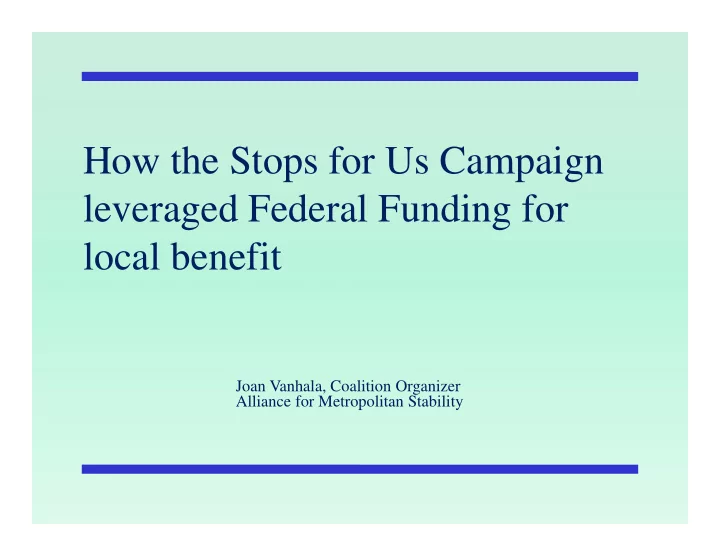

How the Stops for Us Campaign leveraged Federal Funding for local benefit Joan Vanhala, Coalition Organizer Alliance for Metropolitan Stability
In the 1930s, Rondo Avenue was the heart of St. Paul's largest Black neighborhood. African-American families, who had lived in Minnesota for decades, and new arrivals created a vibrant, vital community. Credjafawn Co-op Store 678 Rondo Ave. St. Paul, MN In the 1960s, the construction of Interstate 94 destroyed Rondo Avenue and devastated the historic Rondo neighborhood. 70 businesses were lost and 400 families were displaced. Retrieved from MN Historical Society http://www.mnhs.org/library/tips/history_topics/112rondo.html
When I94 split the community in half, they were spread out between East University Avenue to Selby Avenue. The economic engine of the community was never recovered. We would not allow this history to repeat itself!!
The way Central Corridor was planned I94 Transportation Equity / Stops for Us!
For the Rondo community, the coming of the Central Corridor LRT project on University Ave was a matter of survival as the community still struggled with the devastation of the past. Rondo Avenue today Sons of Rondo: Peter Bell, Metropolitan Council Chair Nathaniel Khaliq, St. Paul NAACP Chair Melvin Carter III, Ward 1 St. Paul City Councilmember
This is our once in a lifetime opportunity to maximize an investment that will shape the growth of our community and our region for the next 100 years. We all must learn from the mistakes made 45 years ago when building Interstate 94 devastated the Rondo Neighborhood.
In 2007, the Stops for Us coalition grew out of the University Avenue Community Coalition to make sure our communities had access to the proposed Central Corridor LRT in St. Paul, MN. Despite our diverse agendas we all agreed that the 3 stations at Western, Victoria, and Hamline should be constructed by the completion of the line. UACC members at Rondo Days 2007
Our members included • Hmong Business • Alliance for Metropolitan Association Stability • ISAIAH • Aurora/St. Anthony • Jewish Community Action Community Development Corporation • Minnesota Center for Environmental Advocacy • Community Stabilization • Transit for Livable Project Communities • District Councils • Housing Preservation Collaborative of Saint Project Paul and Minneapolis • University United Transportation Equity / Stops for Us!
Federal Transit Administration Environmental Justice “Effective transportation decision making depends upon understanding and properly addressing the unique needs of different socioeconomic groups. This is more than a desktop exercise; it requires involving the public. The U.S. DOT is committed to this more comprehensive, inclusive approach. These changes make sure that every transportation project nationwide considers the human environment.” http://www.fhwa.dot.gov/environment/environmental_justice/overview/
WHAT IS ENVIRONMENTAL JUSTICE? There are three fundamental environmental justice principles: • To avoid, minimize, or mitigate disproportionately high and adverse human health and environmental effects, including social and economic effects, on minority populations and low-income populations. • To ensure the full and fair participation by all potentially affected communities in the transportation decision- making process. • To prevent the denial of, reduction in, or significant delay in the receipt of benefits by minority and low-income populations. http://www.fhwa.dot.gov/environment/environmental_justice/overview/ Transportation Equity / Stops for Us!
From left to right: Congressman Ellison, Mayor Rybak, Commissioner Carter, Senator Klobuchar, Sec. LaHood, Commissioner McDonough, City Councilmember Carter, Mayor Coleman On January 25 th , 2010 at a historic press conference in the Rondo neighborhood, Department of Transportation Secretary Ray LaHood announced that the CEI would no longer be a pass/fail measure and the 3 stations would be built for the Environmental Justice communities on the Central Corridor.
The Central Corridor project as it is now Three Stations Transportation Equity / Stops for Us!
As our region continues to build out our transitways, we will pass on what we have learned to other Twin Cities environmental justice communities.
The Future: Reviving our economic engine and our community
Moving forward with Equitable Development Old Home site at Western Station 16
Public transit is a civil rights issue More than forty years ago, Martin Luther King, Jr. recognized transportation as an issue that lies at the intersection of civil rights and economics: “Urban transit systems in most American cities… have become genuine civil rights issues - and a valid one - because the layout of rapid-transit systems determines the accessibility of jobs to the black community. ”
Recommend
More recommend